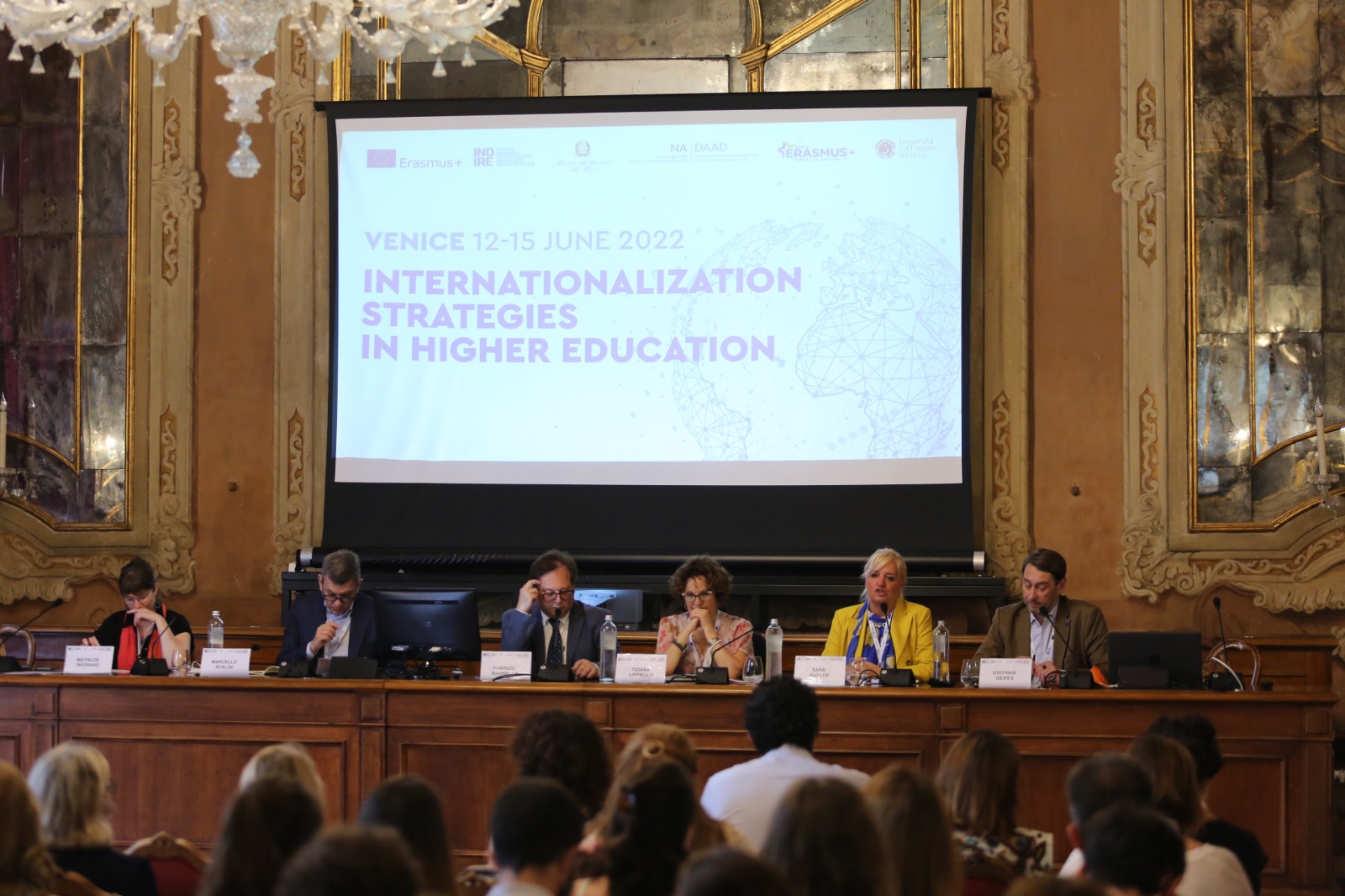indireinforma

The European seminar “Internationalization strategies in higher education“, organized in Venice by the Ca’ Foscari University and the Erasmus+ Indire National Agency, starts today, in collaboration with the Ministry of University and with the Erasmus+ National Agencies of France and Germany. The event is part of the Transnational Cooperation activities provided for by the Erasmus+ Programme. The focus of the initiative is to analyse and improve the international dimension in higher education to remove obstacles that do not allow the full development of mobility for students and teachers and to encourage interinstitutional cooperation.
Over 130 representatives of higher education institutions active in the Programme and from 16 different European countries are present at the event: delegates of the rectors, representatives of UNIMED (Union of Mediterranean Universities), teachers and administrators directly involved in the management of Erasmus+ projects of international mobility and cooperation.
«The international vocation of higher education is a fundamental dimension of the Erasmus Programme and is strongly recommended by the European Commission, as it reflects an open academic community, which welcomes professors, students and staff from all over the world – says Flaminio Galli, Director General of the Erasmus+ INDIRE Agency – In the seminar we pursue this priority mission also by analysing the results of a research on Erasmus flows, carried out by the Ca’ Foscari University together with our Agency, which connects the academic dimension with the commercial and tourist dimension of the various territories».
«I am pleased to be able to host this important seminar at our university, – declares Tiziana Lippiello, Rector of the Ca’ Foscari University of Venice, who takes stock of the Erasmus student mobility programme – at Ca ‘Foscari we have always believed in internationalization as an essential component of university education; exchange programs are an important part of this process. Recently, our Erasmus international mobility activities were evaluated by the Indire Agency with a score of 99 out of 100, a result that makes us proud and pushes us to do even more to offer as many opportunities of this type as possible. We are happy to be able to make our contribution also in terms of research and study of these aspects to explore a topic that must remain among the priorities of education and academic experience».
THE RESEARCH STUDY OF CA’ FOSCARI AND INDIRE
The works include the interventions of Italian and European university professors and address some aspects considered to be the most urgent among those directly related to the issue of internationalization, namely: the synergy of funds and programme actions; the adaptation processes of the territories and the study of the impact of internationalization on various areas (such as the labour market); the removal of obstacles to mobility.
During the seminar, the main results of the European research carried out by the Ca’ Foscari University of Venice and INDIRE entitled “The internationalization of higher education: factors of attractiveness” are also presented.
The study, conducted on the incoming and outgoing data of Erasmus students from 2014 to 2018, shows a strong growth in the period, in particular for the outflows of Italian students, which increased over the period by 32%, while the number of European students who came to Italy rose by 20%.
The research has shown that the choices made by Erasmus students with respect to mobility destinations do not follow the European cooperation network developed at the academic level. Research shows that leading regions in commercial, tourism and academic terms also tend to attract a high number of Erasmus students. In addition, higher education institutions that offer longer stays and with a diversified offer in the study sector and geographically attract students more. However, the number of credits awarded in taking the exams is not a determining factor in the choice of the destination. This could suggest the fact that Erasmus students are looking for a complete and broader educational experience, which may not fall within the mere academic experience in a European university. Finally, higher education institutions located within an urban, metropolitan or border region attract students more, as well as the quality of the institutions and factors related to innovation (e.g. the share of knowledge workers or patents in frontier sectors), are positive determinants of Erasmus mobility flows.
DATA OF THE ERASMUS PROGRAM IN ITALY
From the beginning of the programme (1987) until today, the total number of Italian university students involved in mobility for study or internship have been over 600,000. After the 2018 call for applications (the last before Covid19), Italy has risen to 3rd place for students traveling for study to European destinations (after Spain and France). As far as reception is concerned, 185,189 students have chosen Italy for the Erasmus experience (including study and internship) over the 7-year period (2014-2020); The ratio between students arriving in Italy on Erasmus mobility and the departures of Italians on Erasmus abroad is 72 students coming from abroad out of 100 who went abroad.
OUTGOING MOBILITY 2022 – The second Call of the 2021-2027 Programme provides 105,745,514.00 Euros (+ 42%) to finance the mobility grants for 40,164 students, 39% more than the previous year, and to 5,017 including teachers and staff. 56% of the overall budget was allocated to Lombardy, Lazio, Emilia-Romagna, Veneto and Campania.
Official seminar hashtag: #Erasmusinternational

